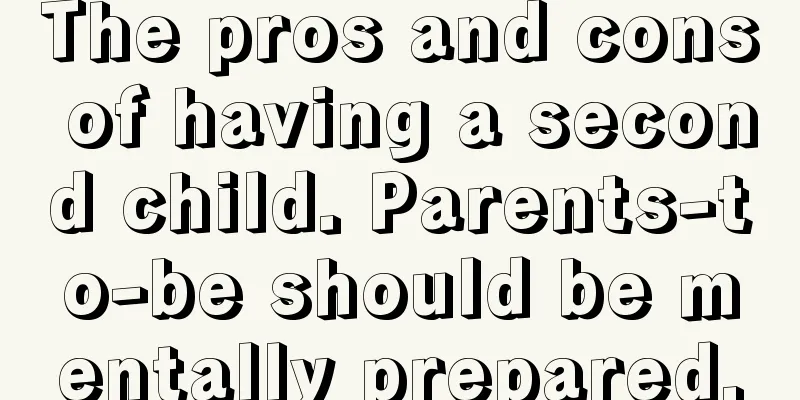Recommended children's sex education picture books Recommended children's sex education books

|
Children's sex education picture books are a good tool for parents to teach their children the concept of men and women. Good picture books can not only help babies learn knowledge, but also help children grow up healthier. Parents must pay attention to sex education to avoid harm to their children when they grow up. Please see the recommended children's sex education books below. Recommended children's sex education picture booksWhere I Come From "Where did I come from?" When many people were young, the answer they got was "I picked it up from a garbage dump." Today, the "picked up" generation has become parents. When faced with children who ask the same question, they don't want to use the answer they got when they were young to fool them, but how should they answer? Recommended reading age: 3-6 years old Lovely Body Why do I have a belly button? Where do sparkling tears come from? What is the function of blood? Children who grow up day by day are full of curiosity about their bodies. However, in the critical period of growth, they don't like to brush their teeth, are afraid of vaccinations, don't understand why they need to have physical examinations, and even often encounter bowel problems. Understanding relevant knowledge is an important cornerstone for cultivating good living habits and maintaining good health. The "Lovely Body" series of picture books uses lively language to explain rich health knowledge, revealing the mysteries of the body to children, allowing them to get to know the lovely body in a relaxing and enjoyable reading experience and learn to be their own "little health guards." Recommended reading age: 3-6 years old "Understanding Virginity" In our cultural context, sex education for children is different from other education, and it requires more wisdom and knowledge from parents. This book explains the laws of sexual development of children aged 0 to 6, helps parents understand the various sexual activities that occur in children's sexual development, and puts forward principles and specific methods to help children's sexual development. Through 10 years of research and practice, author Hu Ping has provided Chinese parents with a comprehensive and systematic method of sexual care and education, leading us to scientifically interpret children's sexual development, so that we can help children appropriately, protect them from sexual harm, and grow up physically and mentally healthy. Recommended reading age: 6-13 years old Don't Touch Me This book teaches children how to protect themselves from sexual abuse. Through a case of child sexual abuse, the book teaches children which private parts of their bodies cannot be touched by anyone, and how to deal with sexual abuse. This book has won the Benjamin Franklin Parenting Award and is used by many families and schools in the United States to teach children about sexual protection. Recommended reading age: 3-6 years old The Story of Breasts Mom, have I also drunk milk from your breasts? When I grow up, will my breasts become the same as yours? What are the breasts that children will come into contact with from birth like? Recommended reading age: 3-6 years old Serena Williams Goes Forward Xiao Wei is a little sperm, he and 300 million friends live in Mr. Brown's body. The day of the swimming competition is getting closer and closer, Xiao Wei is practicing hard every day... He knew he had to swim very fast to win the prize - a beautiful egg. At the end of the race, something magical and wonderful happened! Where did Xiao Wei go in the end? Quickly open this interesting, warm and lovely picture book and take a look... Recommended reading age: 3-6 years old My Little Chili Pepper is Itchy What should you do when your friends make annoying jokes or always want to touch other people's bodies? Through this book, let us understand how to deal with such annoying jokes and learn the correct way to play gender games! Recommended reading age: 3 years old and above The Evil Secret What should you do if an adult or friend touches your body and then says something like "This is a secret between us"? Nini has such a bad secret. What should Nini do now? By reading this book, let us learn some knowledge about preventing sexual assault and the correct way to deal with sexual assault. Recommended reading age: 3-6 years old Boys and Girls Are Different What are the differences between boys and girls? Boys wear pants, girls wear skirts. Boys have short hair, girls have long hair. Boys can't have children, girls can? What other differences are there? Let's take a look. Recommended reading age: 3-6 years old Why am I a girl? Why am I a boy? This is a set of sex education books suitable for children aged 3 to 6. With vivid pictures and words, it answers the question that children are most concerned about: the source of life; it answers children's doubts about their gender; it helps children understand the relationship between their parents and themselves, and lets children learn to love and respect their parents. This book does not understand sex education only as education on reproduction and physiological knowledge, but combines sex education with life education and emotional education, and integrates it into the higher-level cultivation of personality, sentiment, sense of responsibility, etc., to promote the healthy physical and mental development of children. Recommended reading age: 3-6 years old Sex education precautionsWhen parents give their children correct health education, sex education experts believe that the following aspects should be paid attention to: 1. Appropriate age Theoretically, there is no problem in explaining the gender differences between men and women, especially primary sexual characteristics, before children reach puberty. However, based on the current social and cultural situation, it is best to explain the differences between primary sexual characteristics between men and women before the age of 5. Sex education should be relatively advanced, but it cannot be out of the child's ability to understand. 2. Appropriate methods Before the child is 5 years old, parents can use their bodies to speak, but after 5 years old, it is more appropriate to use books, audio-visual materials and other methods. 3. Appropriate content The content of children's sex education should be focused on different age groups. Simple issues such as gender knowledge should be solved before the age of 5. Before puberty, sexual physiology education should be carried out; during puberty, sexual psychology and sexual morality education should be carried out. In short, sex education for children should adhere to the principles of naturalness and appropriateness. It should not be done deliberately, nor should children's problems be viewed from an adult's perspective. Key points for parents to conduct sex educationSexual issues must be answered. Before the age of 18, a child's sexual psychological development is divided into five periods: * Before the age of 3 is the oral stage, when babies like to use pacifiers and suck their fingers; * 3 years old is the period of sexual confusion, when children begin to explore sexual issues; * 6-8 years old is school age, the development of boys and girls is relatively similar, and they can play games together; * Around 10 years old is the early puberty, when boys and girls gradually drift apart; * After entering puberty, due to the influence of sex hormones, girls' breasts develop and boys' testicles enlarge. In the middle and late stages, girls begin menstruation and boys ejaculate. On the one hand, they will be terrified by the changes in their bodies, and on the other hand, they will be particularly curious about the bodies of the opposite sex. If they cannot get answers when asking their parents at this time, they will find ways to explore on their own, such as looking online, or contacting and interacting with girls. Experts say that among the five periods mentioned above, the 3-year-old sexual confusion period is the key period for sex education. To avoid deviations in children's sexual psychology and behavior, parents should give positive answers to children's questions about "sex" at this time, and don't just perfunctorily answer them. Experts suggest that parents can use plants and animals to explain why they are embarrassed to talk about it. "If a child asks where he came from, parents can say that mom and dad loved each other, and dad planted a seed in mom's belly. The seed slowly sprouted and gradually grew into a little man. When the little man matured, mom gave birth to him and let him see this beautiful world. Children will be very satisfied with this answer." It is also a very important part of sex education to gradually separate children from their mothers. Experts say that if children, especially boys, are too attached to their mothers, it will affect their psychological development. She recommends that "children should sleep in separate beds from their parents at around 3 years old." Otherwise, it will not only be detrimental to the relationship between parents, but also the child's ability to socialize with others will not be as good as other independent children, which will lead to withdrawal behavior and reduced adaptability, thus affecting sexual psychology. |
<<: What should I do if my child likes to talk back? Why do children like to talk back?
>>: How to write an essay about summer vacation? An English essay example about summer vacation
Recommend
What is the reason for the baby's dry stool? What is the reason for the baby's green stool?
Babies cannot speak and have no way to express th...
What is bleeding in early pregnancy? What should I do if I have bleeding in early pregnancy?
Bleeding in early pregnancy is a symptom of pregn...
What brand of skin care products is good for breastfeeding? Does using skin care products during breastfeeding have any effect?
Skin needs care at all times. The methods of skin...
Should I reduce the amount of milk for babies with intestinal bloating? Will babies with intestinal bloating lose their appetite?
Infant flatulence is a common symptom, and there ...
How much does a water birth cost? The pros and cons of a water birth
Water birth is a popular way of childbirth. It is...
What material is good for milk powder box? Comparison of 4 major materials
The first type is made of glass, which is safe, h...
Why do you lose weight so quickly after giving birth? 3 reasons for rapid weight loss
First, insist on breastfeeding after giving birth...
How to take better care of breasts after childbirth? Postpartum breast care methods
It is very important for pregnant mothers to take...
Can I sleep on a cool mat during the dog days of summer? Can I sleep on a cool mat during the summer?
China has always attached great importance to nur...
Does Kao toothpaste have a seal? Does Kao toothpaste have a packaging box?
Different toothpastes have different seals, some ...
Can the baby's self-paid vaccines be covered by medical insurance? Which self-paid vaccines are necessary for babies?
After the baby is one year old, parents should ta...
What to eat during pregnancy to keep your baby's skin white during early pregnancy
Although the baby's appearance is largely det...
What should pregnant women prepare for hospitalization before delivery?
Pregnant women need to be well prepared to be adm...
Is sepsis in children contagious? Does sepsis in children have sequelae?
Since childhood sepsis is caused by bacterial inf...
What is the problem with the baby spitting up milk repeatedly? What should I do if the baby always spits up milk?
Breast milk contains rich nutrients, and breastfe...









